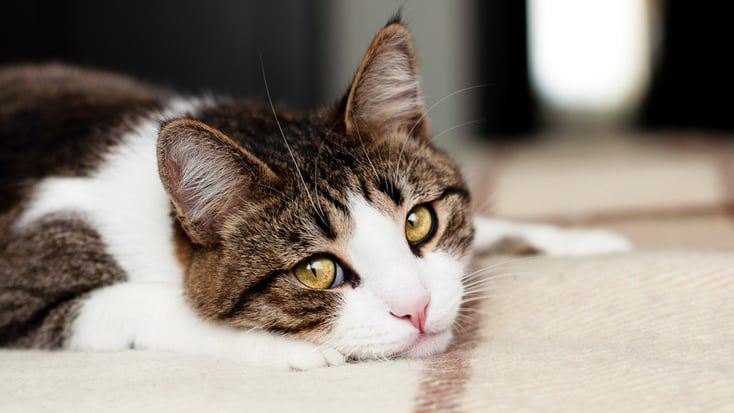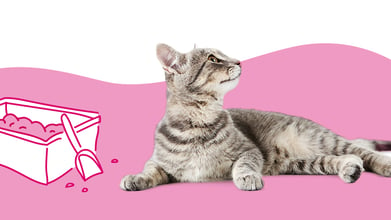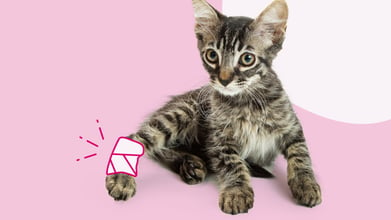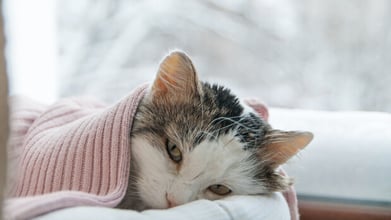Cat Diarrhea: Causes, Symptoms, and How to Treat It

Table of Contents
Mild diarrhea in cats, characterized by frequent, watery stools, typically resolves within 24 hours for kittens and 48 hours for adults; however, if it persists or is accompanied by other symptoms, immediate veterinary care is necessary.
Cat diarrhea is more than just a messy inconvenience; it's a symptom that can indicate an underlying illness or health condition in your feline friend.
As a pet parent, you can recognize changes in your cat's stool and help to determine whether your cat is experiencing a temporary tummy upset or something more serious.
This vet-approved guide will cover the causes, symptoms, and treatments of cat diarrhea, to help you determine next steps for your cat and whether veterinary care is needed,
What Is Cat Diarrhea?
Diarrhea in cats is when they pass loose and watery poop more often than usual. However, it's important to note that just because you see runny stool in the litter box, it doesn't automatically mean your cat has diarrhea.
Types of Diarrhea
Diarrhea in cats can be broadly categorized into two types: acute and chronic diarrhea.
Acute Diarrhea
Acute diarrhea is sudden in onset and may resolve quickly, often within a day. It can be triggered by various factors, such as dietary changes or ingestion of something unsuitable.
Chronic Diarrhea
Chronic diarrhea persists for an extended period, typically lasting three to four weeks or even longer. It often indicates more severe underlying issues, such as infections, inflammatory bowel disease, or other health conditions.
Chronic diarrhea usually requires veterinary intervention to determine the cause and appropriate treatment.
Symptoms of Diarrhea in Cats
To truly determine if your cat is experiencing diarrhea, it’s important to know the clinical signs as well as the severity of the symptoms.
These are the most common symptoms of diarrhea.
- Frequent bowel movements
- Straining
- Watery stool
- Mucus in the stool
- Increased output of stool
- Abnormal color stools
If your cat is experiencing one or more of these symptoms for more than 48 hours (24 for kittens) then you’ll want to consult with a veterinarian for further guidance.
Should My Pet Be Seen by a Veterinarian?
1. Have you noticed changes in your pet’s appetite?
2. Does your pet have diarrhea or loose stools?
3. Have you noticed changes in your pet’s thirst/water consumption?
4. Is your pet having accidents in the house?
5. Is your pet pacing and unable to settle?
6. Is your pet panting more than usual?
7. Is your pet whining or vocalizing more than usual?
8. Is your pet shaking more than usual?
9. Is your pet hiding or avoiding physical contact more than usual?
10. Is your pet more lethargic and sleeping more than usual?
11. Are you concerned about changes in your pet’s behavior?
12. Is your pet scratching their ears?
13. Is your pet licking their paws more than usual?
14. Does your pet have a rash?
15. Is your pet moving more slowly than usual or having a harder time getting up or down?
View Results
Should My Pet Be Seen by a Veterinarian?
1. Have you noticed changes in your pet’s appetite?
2. Does your pet have diarrhea or loose stools?
3. Have you noticed changes in your pet’s thirst/water consumption?
4. Is your pet having accidents in the house?
5. Is your pet pacing and unable to settle?
6. Is your pet panting more than usual?
7. Is your pet whining or vocalizing more than usual?
8. Is your pet shaking more than usual?
9. Is your pet hiding or avoiding physical contact more than usual?
10. Is your pet more lethargic and sleeping more than usual?
11. Are you concerned about changes in your pet’s behavior?
12. Is your pet scratching their ears?
13. Is your pet licking their paws more than usual?
14. Does your pet have a rash?
15. Is your pet moving more slowly than usual or having a harder time getting up or down?
Share Quiz
Causes of Diarrhea in Cats
Cat diarrhea can develop from a variety of causes, including dietary changes, food sensitivities, infections, inflammatory conditions, and other underlying health issues.
Here are the common causes of diarrhea in cats explained in further detail:
Diet
Dietary issues, sudden changes in diet, or new food can disrupt gut health and cause diarrhea in cats. Different ingredients or rich food are often too potent for their stomachs.
Food Allergies or Intolerances
Diarrhea can be caused by food sensitivities brought on by food allergies and intolerance.
Bacterial, Parasitic, and Viral infections
Infectious factors like intestinal parasites, viruses, and bacteria can cause diarrhea in cats. Stools with mucus are a sign of parasitic infections, while yellow stools can be a sign of harmful bacteria.
Inflammatory Bowel Disease (IBS)
Inflammatory bowel disease (IBS) can cause inflammation of the intestines, which can lead to chronic diarrhea. If the stomach is involved, it can cause chronic vomiting.
Other Underlying Health Conditions
Tumors of the bowel or liver disease can also result in diarrhea. Blood in your cat's poop is a sign of intestinal tract bleeding, and you should visit your veterinarian immediately.
Recognizing these potential triggers can aid in early intervention and appropriate care.
When to Seek Veterinary Help
While mild diarrhea in cats often resolves by itself, it's important to monitor your cat’s symptoms and seek veterinary help when persistent or severe.
If you observe any of the following signs, you should let your veterinarian know:
- Loss of appetite
- Abdominal discomfort or pain
- Continuous or recurring episodes of diarrhea
- Presence of blood in the stool
- Vomiting
- Lethargy or unusual tiredness
- Noticeable weight loss
- Suspicions of consuming contaminated food
A Vet's Diagnosis of Cat Diarrhea
Your veterinarian may recommend further testing if the cause of your cat’s diarrhea is not clear or if symptoms are persisting beyond a few days.
These diagnostic tests may include:
- Fecal tests: includes antigen testing, cytology, fecal flotation, and culturing. This determines whether it's an infectious agent or inflammatory bowel disease causing diarrhea.
- Blood work: screens for systemic or metabolic causes of diarrhea.
- Ultrasound and X-rays: abdominal ultrasound, radiology, endoscopy, biopsy, and colonoscopy are examinations to rule out tumors and foreign objects.
Treating Diarrhea Symptoms in Cats
After your cat is examined and the cause determined, your vet will suggest the appropriate treatment.
Common treatment for a cat experiencing symptoms of diarrhea include:
- Diet changes: a change in your cat's diet may be enough for mild diarrhea.
- Medications: in chronic cases, the veterinarian may give cat diarrhea medicine in addition to dietary recommendations.
- Immunosuppressive drugs: these drugs are given if the underlying cause is inflammatory bowel disease.
- Antibiotics: Antibiotics are used to treat bacterial infections. Always follow your veterinarian's instructions and complete the course, even if your pet seems better.
📒 Note: Refrain from using human medications on your cat because they can do more harm than good.
Recovery and In-Home Care Options
You can help your pet recover from acute diarrhea by trying the following home remedies:
- Bland meals: I recommend small, regular, bland meals like white fish or boiled chicken.
- Water intake: cats can get dehydrated from diarrhea, so ensure your cat has continuous access to fresh water.
- Rest: to help speed recovery and avoid a relapse, allow your cat plenty of rest and follow your veterinarian’s instructions.
Preventing Your Cat from Getting Diarrhea
The following tips may help you prevent future episodes of diarrhea in your cat:
- Follow your vet's recommended deworming schedule
- Ensure dietary transitions are gradual if you need to change your cat's food
- Avoid ingredients known to cause food allergies and food intolerances
- Dispose of spoiled or old food that can make your cat sick
- Prevent your cat from scavenging
Conclusion
Many cats will experience diarrhea at some point, and most of the time, it’s a short-term concern. Because one of the leading causes of cat diarrhea involves food, finding a balanced diet that suits your feline friends is essential.
Mild diarrhea is usually nothing to worry about and can be managed at home without medication. Symptoms that are persistent or severe are a reason to book a sick pet visit.
Same-Day In-Home Sick Pet Visits
Don't wait for your pet's condition to worsen. Our mobile veterinarians provide same-day and next-day in-home sick pet visits. Schedule now for peace of mind.
Frequently Asked Questions
It's not uncommon for cats to experience mild diarrhea. If they seem fine and the diarrhea resolves within a couple of days, there's no reason to worry.
Cats are obligate carnivores, meaning they need meat-based protein daily. It's best to offer your sick cat a bland diet containing protein, such as boiled chicken. Pumpkin will not hurt your cat, if you want to mix it with their meat-based food.
Most of the time, if your cat has a mild case with no other symptoms, it should resolve within 48 hours.
While it’s hard to pinpoint just one common cause, eating something your cat shouldn’t have or the presence of intestinal parasites are two of the most frequent culprits.
Any new food that is not introduced slowly could cause a case of runny stools in your cat.






